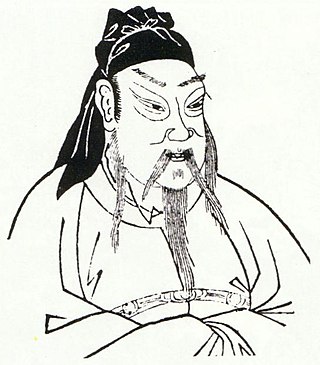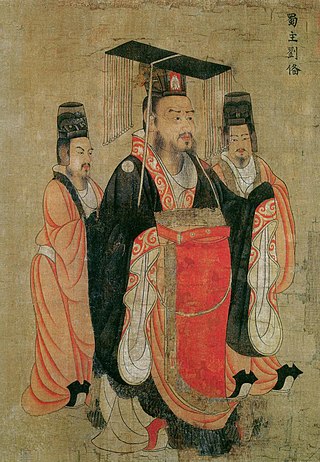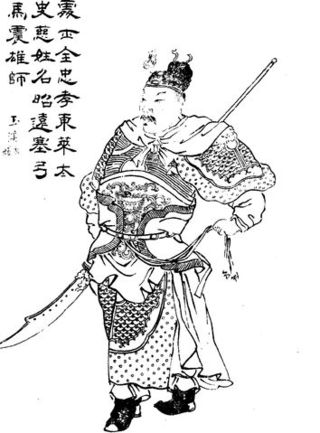
Guan Yu,courtesy name Yunchang,was a Chinese military general serving under the warlord Liu Bei during the late Eastern Han dynasty of China. Along with Zhang Fei,he shared a brotherly relationship with Liu Bei and accompanied him on most of his early exploits. Guan Yu played a significant role in the events leading up to the end of the Han dynasty and the establishment of Liu Bei's state of Shu Han during the Three Kingdoms period. While he is remembered for his loyalty towards Liu Bei,he is also known for repaying Cao Cao's kindness by slaying Yan Liang,a general under Cao Cao's rival Yuan Shao,at the Battle of Boma. After Liu Bei gained control of Yi Province in 214,Guan Yu remained in Jing Province to govern and defend the area for about seven years. In 219,while he was away fighting Cao Cao's forces at the Battle of Fancheng,Liu Bei's ally Sun Quan broke the Sun–Liu alliance and sent his general LüMeng to conquer Liu Bei's territories in Jing Province. By the time Guan Yu found out about the loss of Jing Province after his defeat at Fancheng,it was too late. He was subsequently captured in an ambush by Sun Quan's forces and executed.

Cao Cao,courtesy name Mengde,was a Chinese statesman,warlord,and poet who rose to power during the end of the Han dynasty,ultimately taking effective control of the Han central government. He laid the foundation for what was to become the state of Cao Wei (220–265),established by his son and successor Cao Pi,who ended the Eastern Han dynasty and inaugurated the Three Kingdoms period (220–280). Beginning in his own lifetime,a corpus of legends developed around Cao Cao which built upon his talent,his cruelty,and his perceived eccentricities.

The Battle of Xiaoting (猇亭之戰),also known as the Battle of Yiling and the Battle of Yiling and Xiaoting,was fought between the state of Shu and the state of Wu,between the years 221 and 222 in the early Three Kingdoms period of China. The battle is significant because Wu was able to turn the situation from a series of initial losses into a defensive stalemate,before proceeding to win a decisive victory over Shu. The Wu victory halted the Shu invasion and preceded the death of Liu Bei,Shu's founding emperor.

Liu Bei,courtesy name Xuande (玄德),was a Chinese warlord in the late Eastern Han dynasty who later became the founding emperor of Shu Han,one of the Three Kingdoms of China.

Zhuge Liang,also commonly known by his courtesy name Kongming,was a Chinese statesman,strategist,and inventor who lived through the end of the Eastern Han dynasty and the early Three Kingdoms period (220–280) of China. During the Three Kingdoms period,he served as the Imperial Chancellor of the state of Shu Han (221–263) from its founding in 221 and later as regent from 223 until his death in September or October 234.

Taishi Ci (166–206),courtesy name Ziyi,was a Chinese military general who lived during the late Eastern Han dynasty of China. He had served as a minor Han official,before eventually coming to serve warlords Liu Yao,Sun Ce,and Sun Ce's successor Sun Quan.

Zhang Zhao (156–236),courtesy name Zibu,was a Chinese calligrapher,essayist,military general,and politician. He served as an official of the state of Eastern Wu during the Three Kingdoms period of China. Born in the late Eastern Han dynasty,Zhang Zhao started his career as a scholar in his native Xu Province before the chaos towards the end of the Eastern Han dynasty forced him to flee south to the Jiangdong region for shelter. In Jiangdong,Zhang Zhao became an adviser to the rising warlord Sun Ce. After Sun Ce's death in the year 200,Zhang Zhao played a key supporting role to Sun Ce's younger brother and successor,Sun Quan,as he consolidated power and his control over the Jiangdong territories. In 208,Zhang Zhao strongly urged Sun Quan to surrender to Cao Cao,a rival warlord,because he believed that they stood no chance against an impending invasion by Cao Cao. However,Sun Quan refused to listen to Zhang Zhao and instead heeded the advice of Lu Su and Zhou Yu. Sun Quan's forces ultimately scored a decisive victory over Cao Cao at the Battle of Red Cliffs in the winter of 208. From 200 until his death in 236,Zhang Zhao served under Sun Quan through the collapse of the Eastern Han dynasty and into the Three Kingdoms period after Sun Quan became the founding emperor of the Eastern Wu state. Throughout his career,Zhang Zhao was known for being a stern,uncompromising and intimidating figure who commanded respect from both his colleagues and Sun Quan. Despite Zhang Zhao's seniority and experience,Sun Quan passed him over twice as a candidate for the position of Imperial Chancellor in 222 and 225 as he believed that Zhang Zhao was so headstrong and stubborn that he would not be able to effectively lead the administration. Nevertheless,Sun Quan paid his due respects to Zhang Zhao as a mentor-like figure who saw him through his formative years to his accession to the throne.

Deng Ai,courtesy name Shizai,was a Chinese military general and politician of the state of Wei during the Three Kingdoms period of China. He is best known for his pivotal role in the Wei conquest of its rival state,Shu,in 263. He was described as a very loyal subject who made great contributions to Wei,but was also noted for his arrogance and audacity,which led to his downfall and death.
Lu Kai,courtesy name Jingfeng,was a Chinese military general and politician of the state of Eastern Wu during the Three Kingdoms period of China. Born in the influential Lu clan of the Wu region towards the end of the Eastern Han dynasty,Lu Kai started his career around the beginning of the Three Kingdoms period as a county chief and later a military officer under Sun Quan,the founding emperor of Eastern Wu. During the reign of Sun Liang,he participated in some battles against bandits and Eastern Wu's rival state Cao Wei,and was promoted to the rank of General. Throughout the reign of Sun Xiu and early reign of Sun Hao,Lu Kai continued to hold military commands until September or October 266,when Sun Hao appointed him and Wan Yu as the Left and Right Imperial Chancellors of Eastern Wu respectively. Well known for being outspoken and candid,Lu Kai strongly objected to Sun Hao's decision to move the imperial capital from Jianye to Wuchang in 265,attempted to dissuade Sun Hao from going to war with the Jin dynasty that replaced the Cao Wei state in 266,and spoke up against Sun Hao's cruel and extravagant ways on numerous occasions. Although Sun Hao deeply resented Lu Kai for openly defying him,he tolerated Lu Kai because Lu Kai held an important office and also because he did not want to antagonise the Lu clan. After Lu Kai's death,Sun Hao sent his family away to a distant commandery in the south.

The Jingnan campaign,or Jingnan rebellion,was a three-year civil war from 1399 to 1402 in the early years of the Ming dynasty of China. It occurred between two descendants of the Ming dynasty's founder Zhu Yuanzhang:his grandson Zhu Yunwen by his first son,and Zhu Yuanzhang's fourth son Zhu Di,Prince of Yan. Though Zhu Yunwen had been the chosen crown prince of Zhu Yuanzhang and been made emperor upon the death of his grandfather in 1398,friction began immediately after Yuanzhang's death. Zhu Yunwen began arresting Zhu Yuanzhang's other sons immediately,seeking to decrease their threat. But within a year open military conflict began,and the war continued until the forces of the Prince of Yan captured the imperial capital Nanjing. The fall of Nanjing was followed by the demise of the Jianwen Emperor,Zhu Yunwen. Zhu Di was then crowned the Ming Dynasty's third emperor,the Yongle Emperor.
This is a family tree of the main line of descent of Confucius.
Jiang Ji,courtesy name Zitong,was an official and military general of the state of Cao Wei during the Three Kingdoms period of China. Born in the late Eastern Han dynasty,Jiang Ji started his career as a low-level official in his native Yang Province before becoming a subordinate of Cao Cao,the warlord who controlled the central government towards the end of the Eastern Han dynasty. After the end of the Eastern Han dynasty,he served in the state of Cao Wei through the reigns of the first three emperors –Cao Pi,Cao Rui and Cao Fang –and held various appointments in the military before rising to Grand Commandant,one of the top positions in the central government. During his service in Wei,he was known for being candid in giving advice to the emperor on various issues,including consolidating power,halting labour-intensive construction projects,and officials' abuses of power. In February 249,he joined the regent Sima Yi in staging a successful coup d'état against his co-regent Cao Shuang,but died from illness a few months later.
Xun Xu,courtesy name Gongzeng,was a Chinese musician,painter,politician,and writer who lived during the late Three Kingdoms period and early Jin dynasty of China. Born in the influential Xun family,he was a great-grandson of Xun Shuang and a distant maternal relative of Zhong Yao's family. He served as an official in the state of Cao Wei in the late Three Kingdoms era before serving under the Jin dynasty.
Su Ze,courtesy name Wenshi,was an official of the state of Cao Wei during the Three Kingdoms period of China. Born in the late Eastern Han dynasty,he started his career as the Administrator of various commanderies in northwest China and is best known for governing Jincheng Commandery between 215 and 220. During his tenure,he rebuilt the war-torn commandery,gained the support of local non-Han Chinese tribes,opened up trade along the Hexi Corridor,and suppressed rebellions in the neighbouring Xiping,Wuwei,Jiuquan and Zhangye commanderies. After the end of the Eastern Han dynasty,Su Ze served in the Cao Wei state under its first ruler,Cao Pi,as a Palace Attendant. An upright and outspoken man,he did not hesitate to speak up when he disagreed with Cao Pi,who became wary of him. In 223,Su Ze died of illness while travelling to present-day Shandong to assume a new appointment.

Lishan Laomu is the goddess of Mount Li in Chinese religion. She is a popular female immortal in the Taoist pantheon,and a high-ranking one according to some late sources. Legend has it that Lishan Laomu,whose surname and origin remain mysterious,is a supremely elevated female immortal dwelling deep within the Mount Li. Her origins are said to derive from Nüwa,the legendary creator and mother goddess.

Liu Kun,courtesy name Yueshi,was a Chinese military general and poet of the Jin dynasty. An esteemed writer during the early years of his career,he was also known for his time as the Inspector of Bingzhou,during which he spearheaded Jin's efforts in fighting back against the Xiongnu-led Han-Zhao dynasty. Despite his determination and active role in the war against Han,he lacked the sufficient military and administrative skills to quash the growing Han threat,suffering repeated defeats and having to heavily rely on his alliance with the Tuoba-Xianbei. He was eventually driven out from Bingzhou following a decisive defeat to Shi Le in 316 and fled to Youzhou,where he allied with the chieftain,Duan Pidi. After Pidi suspected him of betrayal,he was arrested and executed via strangulation in 318.
Huan Yi,courtesy name Shuxia was a Chinese military general and musician of the Jin dynasty (266–420). He was a very popular administrator among the people of Yuzhou,from his early days of Prefect of Huainan to Inspector of the province. He participated in the famous Battle of Fei River in 383,fighting alongside Xie Xuan as they repel Former Qin forces. Outside his military career,Huan Yi was most known for was his contribution in music. It is believed that he was the original composer of the popular guqin composition "Mei Hua Sannong (梅花三弄)" or "3 Variations on the Plum Blossom".
Liu Ji'en,also known in historiography as Shaozhu of Northern Han,was the third emperor of China's Northern Han dynasty during the Five Dynasties and Ten Kingdoms period. He ruled for 60 days in 968 before being killed.
Li Mi (224–287),courtesy name Lingbo,was an official and scholar of the state of Shu Han in the Three Kingdoms period of China. After the fall of Shu in 263,he continued serving under the Jin dynasty,that succeeded Cao Wei state in 266.
















